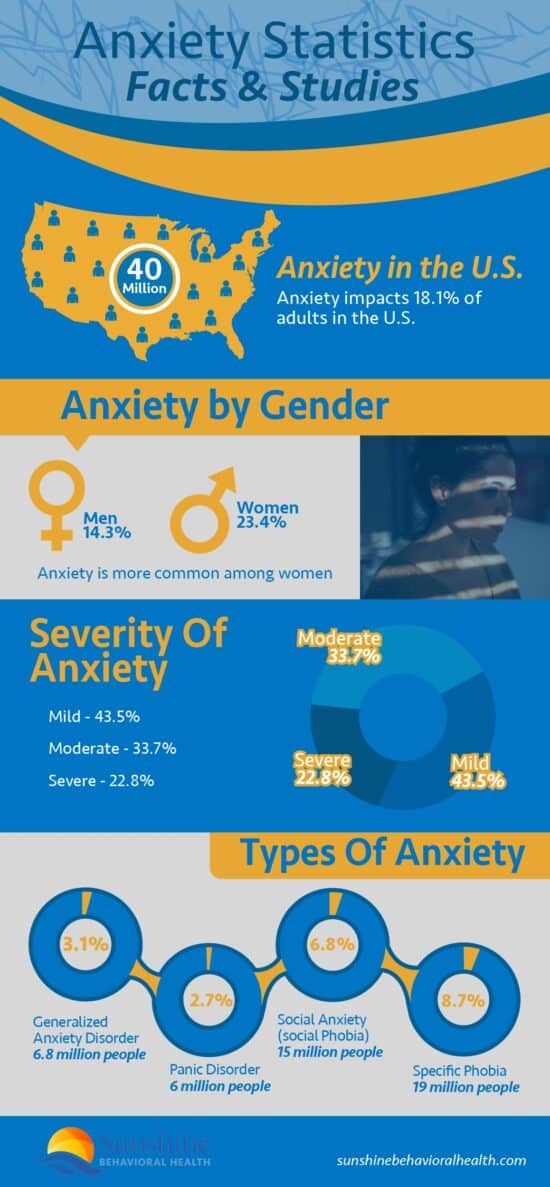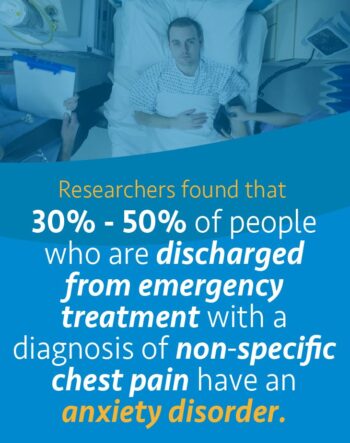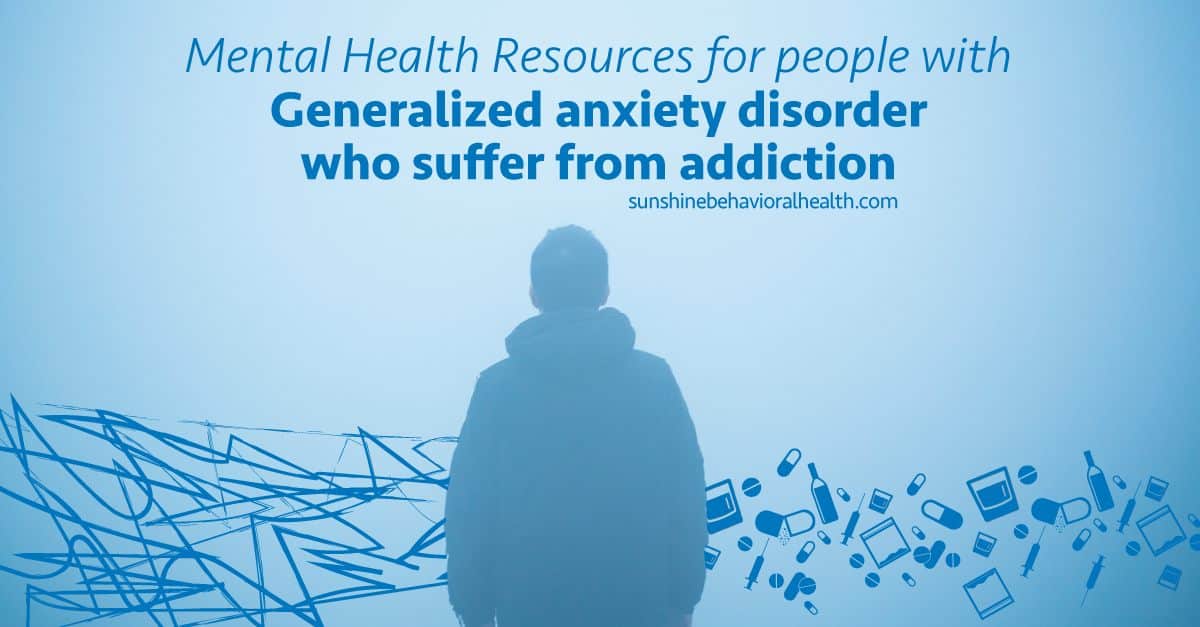Many people with anxiety disorders also face substance use disorder or addictions.
After studying more than 43,000 participants for the National Epidemiological Survey on Alcohol and Related Conditions (NESARC), researchers discovered that 17.7% of the survey respondents met the diagnostic criteria for an anxiety disorder and had a current substance use disorder (SUD).
When people have both conditions, it is sometimes known as a dual diagnosis or comorbidity.
Understanding dual diagnosis can help people facing these issues.
What Is Generalized Anxiety Disorder (GAD)?
One common form of anxiety is generalized anxiety disorder (GAD). A classic symptom of generalized anxiety disorder is uncontrollable worry, generally about everyday situations.
While anxiety can be expected around acute issues that can arise and cause stress, it is when anxious thoughts become persistent and invasive that professionals believe that someone might be experiencing GAD.
Many people with GAD get to the point where they feel worried even when they know that there is no specific reason to be worried. This inability to define the source of the worry is one of the hallmark symptoms of GAD, as its duration: the anxiety associated with GAD tends to persist over six months or more.
People with GAD frequently report feeling a sense of pending doom, as though something bad is about to happen, without being able to attach this feeling to any particular cause. People with GAD may also report not being able to calm themselves down, experiencing anxiety and intrusive thoughts at high levels throughout their days.
These persistent worrying thoughts can interfere with their sleeping, eating, work, school, and personal relationships.
People experiencing GAD often struggle to sleep or find comfort or respite from their persistent thoughts. As a result, some people may turn to using drugs or alcohol as a way of coping.
While such substances may alter their thoughts and help them find relief in the short-term, using these substances long-term can make people vulnerable to addiction and worsen their health. Professional support can help individuals develop healthier coping strategies.

Which Came First: Anxiety or Addiction?
It can be extremely difficult if not impossible to identify whether an anxiety disorder or substance use disorder came first. Each of these disorders can worsen the symptom of the other. For example, panic attacks that accompany some anxiety disorders could compel someone to use substances to numb themselves, but the substance use could also cause intoxication and shame that could make anxiety worse.
There are also multiple types of anxiety disorders. Generalized anxiety disorder (GAD) is one type of anxiety disorder, but individuals may also have social anxiety disorder, panic disorder, post-traumatic stress disorder (PTSD), phobias, or other conditions.
Generalized Anxiety Disorder and Addiction
 Generalized anxiety disorder (GAD) and addiction disorders can vary significantly from person to person. The two disorders may relate to each other and worsen each other in different ways for each individual.
Generalized anxiety disorder (GAD) and addiction disorders can vary significantly from person to person. The two disorders may relate to each other and worsen each other in different ways for each individual.
It can be helpful to study the symptoms of each disorder and examine whether an individual’s behavior corresponds to those symptoms or changes over time. People in close contact with individuals suffering from these disorders may struggle to clearly spot the changes.
Consider seeking the advice of a mental health professional to confirm whether a disorder is occurring.
Symptoms of GAD
Common symptoms of GAD include:
- Intrusive thoughts
- Feeling that something bad is going to happen, without being able to name specifics
- Problems concentrating, focusing, or sleeping
- Feeling fatigued or exhausted
- Persistent tension or soreness in muscles
- Gastrointestinal issues including nausea, stomach aches, or diarrhea
- Breaking into sweats or experiencing sweaty palms
- Heart palpitations or sudden bursts of pain or chest tightness
- Numbness, tingling, or other neurological symptoms that do not have a pathological cause
Health care professionals often refer to GAD as a disorder of exclusion, meaning that they try to rule out physical problems such as heart disease, certain cancers, and other physical and mental conditions that might be responsible for the symptoms an individual is experiencing.
In fact, many people who seek emergency treatment are released with a diagnosis of non-specific chest pain, meaning there is no clear organic disease behind their chest pain. Research has shown that 30% to 50% of these cases have an anxiety disorder.
Symptoms of Addiction
Addiction can come in many forms. Alcohol or drug addiction is often known as substance use disorder, and it occurs when an individual cannot control their use of a substance (legal or illegal).
Some people say that addiction can also revolve around behaviors, such as addictions to gambling, spending money, or sex.
Despite the range of substances and behaviors to which an individual may be addicted, there are some changes in behavior that often signal a potential addiction. Some common signs of addiction may include:
- Secretiveness, deceptiveness, or stealing
- Wide fluctuations in finances, from having ample cash to being without money
- Sudden changes in friends and social groups
- Trips or phone calls that are mysterious and often urgent
- Drug paraphernalia or stashes contained in nondescript plastic, paper, or foil packaging
- Changes in mood, energy level, weight, skin tone, and/or pupil size
- Extended underperformance or even absences from work, school, and other regular commitments
- High irritability and avoidance
Approaching someone who might be struggling with addiction can be challenging. It can be difficult to know for sure if they are struggling with addiction.
That’s because behaviors that seem like addiction-related behaviors might relate to other issues. It’s also because many people struggling with addiction feel shame and stigma. They might be afraid of being judged, so they might not be honest about their struggles.
Treating GAD and Addiction
Not seeking treatment for GAD and addiction can make both conditions worse. Treating only one condition and not the other can predispose people to relapsing into addiction, so it’s important to seek therapy that addresses both conditions.
Treatment should work with individuals to develop healthy and effective coping strategies. Some treatment modalities that aim to address both GAD and addiction include:
- Cognitive behavioral therapy (CBT), where a practitioner helps an individual identify their negative thought patterns and develop strategies to handle them.
- Medication-assisted therapy (MAT), which helps provide a safe space for addiction withdrawal while also treating anxiety symptoms.
- Family therapy, which provides assistance to create support systems that positively reinforce healthy coping strategies.
- Peer support, where people meet with others to work through shame and other negative thoughts that may emerge when treating anxiety disorders as well as GAD.
An effective treatment strategy might incorporate one or more of these modalities. There are various resources that people can utilize, whether for themselves or a loved one.
Mental Health Resources to Treat GAD and Addiction
Substance Use Disorder and Mental Health Services Administration (SAMHSA) – https://www.samhsa.gov
The overlap between mental health and substance use disorder is so large, there is an entire government agency devoted to managing it. This website serves as a portal with information on disorders and also offers various ways for the public to find assistance.
Using the SAMHSA Find Treatment page and the agency’s other tools, people can find local treatment facilities that are both convenient and discreet.
SAMHSA also features hotlines that are confidential and provide 24/7 support so that no one needs to struggle alone. The site can be a starting point for learning about addiction and finding treatment options.
U.S. states and larger metropolitan areas offer community behavioral health options. Some also have government-affiliated departments that address drugs, alcohol, or addiction.
These resources might help people find counselors who can help find options for treatment and financial support. Even people who do not have any medical insurance can find assistance to treat their addiction and anxiety.
MentalHealth.gov
The U.S. Department of Health & Human Services maintains its own site that strives to increase public awareness around mental health issues. This site includes:
- Information about disorders
- Signals to look for to spot problems
- Pointers for talking about mental health
- Tips for finding help: emergency resources, veterans’ resources, a guide to health insurance and mental health services, and clinical trials
Like other government sites, this website is also available in Spanish to help ensure that as many Americans as possible realize that support is within their reach.
Support Groups
There are groups that allow people recovering from addictions to meet and provide support for each other.
A number of the groups are known as 12-step groups because they encourage members to progress through a series of twelve steps. The most famous is Alcoholics Anonymous (AA), but there are other twelve-step recovery programs that help people recover from addictions and compulsive behaviors.
While the groups are more focused on confronting addiction than anxiety, the programs can help people address behaviors that overlap with or contribute to generalized anxiety disorder or other psychological conditions.
In addition to 12-step groups, other support groups include Secular Organizations for Sobriety (SOS) and SMART Recovery. There is a strong peer support element in all these resources, which can help diffuse shame and empower people to successfully address their addictions.
Of note, some programs also offer family support groups, which operate independently of the anonymous individual’s participation but can help loved ones cope and understand their loved ones.
Apps for Mental Health Support
There are various phone apps that are now available, at varying price points, that can help provide support for generalized anxiety disorder and addiction management.
Headspace and Calm both offer on-demand meditation and mindfulness practice through free and paid options. Meditation and mindfulness have both been shown to be effective against stress and useful in addressing and coping with some of the negative thought patterns that can lead to anxiety or addiction.
7Cups and Circle both offer on-demand emotional support through one-on-one sessions or group meetings. While these are two of the oldest platforms for this kind of support, there are new ones arriving on a frequent basis.
Inpatient Treatment
Accredited inpatient treatment facilities can help provide 24-7 care during times of acute crises and help people address long-standing addiction and anxiety issues. Insurance coverage, financial aid, or other arrangements may help people cover the costs.
While many people grapple with generalized anxiety disorder (GAD) and addiction, they don’t have to do so. They can find assistance to address their problems and ensure that they don’t make each other worse.
Sources
Medical disclaimer:
Sunshine Behavioral Health strives to help people who are facing substance abuse, addiction, mental health disorders, or a combination of these conditions. It does this by providing compassionate care and evidence-based content that addresses health, treatment, and recovery.
Licensed medical professionals review material we publish on our site. The material is not a substitute for qualified medical diagnoses, treatment, or advice. It should not be used to replace the suggestions of your personal physician or other health care professionals.






